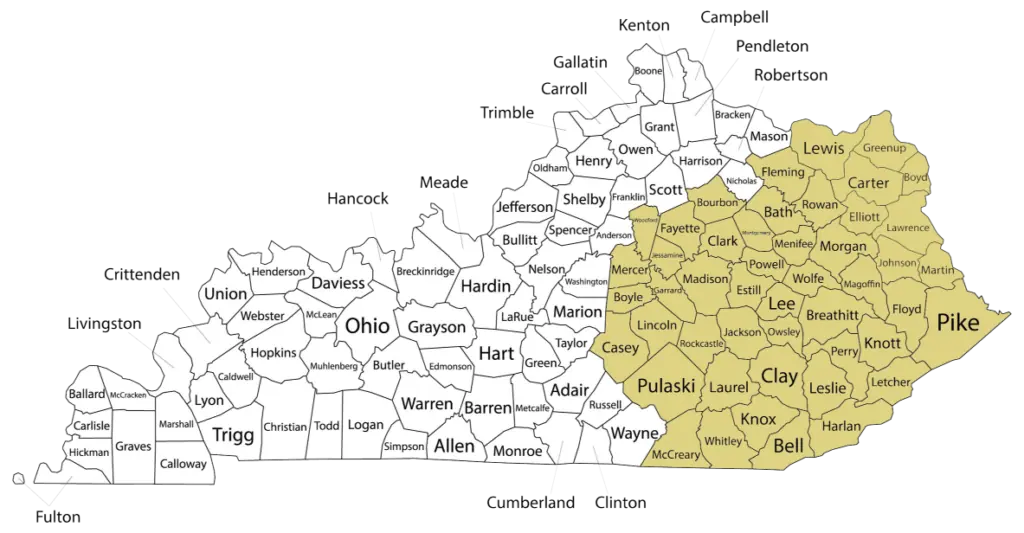At Elder Law Guidance, we help Kentucky families qualify for Medicaid while protecting their home, savings, and dignity. Since 2015, our team has guided seniors and adult children through Medicaid planning, asset protection, and long-term care decisions with calm guidance and no pressure.
Here in Kentucky, the need for thoughtful Medicaid planning is real. More than 10% of Richmond’s population is age 65 or older, and across Kentucky, over 1.4 million residents rely on Medicaid for health and long-term care support. Clients often come to us overwhelmed and unsure where to start. As one client shared, “They calmed all fears that I had during a traumatic time with my elder mother.” We take the time to explain the rules, the options, and the next steps so families can make informed decisions without feeling rushed or talked down to.
If you are worried about nursing home costs, eligibility rules, or protecting your family’s future, you do not have to figure this out alone. A clear plan can bring peace of mind sooner than you think.
What Is Medicaid Planning and Why It Matters in Kentucky
Medicaid planning is the legal process of helping individuals qualify for Medicaid while protecting their assets, income, and family stability. In Kentucky, this planning is especially important because the cost of long-term care can quickly drain a lifetime of savings if steps are not taken in advance.
Many families assume Medicaid is only available after everything is spent down. In reality, Kentucky Medicaid has specific rules around income, assets, and a five-year lookback period that determine eligibility.
For seniors in Richmond, Lexington, and communities across Kentucky, Medicaid often becomes part of the conversation when care is needed at hospitals or long-term care facilities that accept Medicaid. At that point, families are already under stress. Planning ahead gives you options and time.
At Elder Law Guidance, we focus on education first. We explain how Kentucky Medicaid works, what counts toward eligibility, and which planning tools are appropriate for your situation. Our goal is clarity and a plan that protects your family from starting over.
Our Medicaid Planning Services in Kentucky
- Medicaid eligibility planning
- Medicaid-compliant asset protection strategies
- Medicaid spend-down planning
- Medicaid crisis planning for urgent care situations
- Long-term care planning
- Protection of the family home and savings
- Veterans benefits coordination
- Estate planning
- Special needs planning
- Guidance through the Medicaid application process
Every family’s situation is different, and our role is to help you understand which of these tools apply to you and why. You will never be rushed or pushed into decisions that do not feel right for your family.

Get Trusted Legal Support Today
For straightforward legal advice and representation, contact Elder Law Guidance. Call (859) 544-6012 to schedule your consultation.
Why Families Across Kentucky Choose Elder Law Guidance
Families choose Elder Law Guidance because they want more than legal documents. They want understanding, steadiness, and a plan that truly fits their lives.
Accessible and Family-Focused Process
Flexible scheduling, respectful communication, and ongoing support to confirm the process works around your family, not the other way around.egies that will allow you to keep your money without sacrificing your benefits.
Education-First Advocacy
We explain every option in plain language so you understand the “why” behind each decision, not just the paperwork in front of you.
No-Pressure Guidance
Families come to us during stressful moments. We slow the process down, reduce anxiety, and give you space to make thoughtful choices.
Team-Based, Coordinated Support
Clients work with a consistent, knowledgeable team that communicates clearly and coordinates with financial advisors, CPAs, and family members when needed.
Asset and Legacy Protection
Our focus is not just qualifying for Medicaid today, but protecting what you have built so your family does not have to start over tomorrow.
Elder Law and Veterans Benefits Experience
We integrate Medicaid planning with elder law and veterans benefits to create solutions that work together, not in isolation.
How Medicaid Planning Protects Your Home, Savings, and Family
In Kentucky, Medicaid rules determine what assets count toward eligibility and which can be protected. With proper planning, many families are able to preserve the family home, protect savings, and maintain financial stability. Without guidance, even small mistakes can trigger penalties or delays that increase stress and cost.
Beyond finances, Medicaid planning protects people. It gives spouses security, allows adult children to focus on caregiving instead of paperwork, and helps seniors receive care with dignity. Families often tell us the emotional relief matters just as much as the financial protection. Having a plan replaces uncertainty with clarity and direction.
At Elder Law Guidance, we approach Medicaid planning with the understanding that these decisions affect real people and real families. Our education-first process is designed to reduce fear, explain your options clearly, and help you move forward knowing your family is protected.
About Elder Law Guidance
Elder Law Guidance was founded in October 2015 with a clear purpose to protect families from starting over each generation by preserving assets, dignity, and peace of mind. Led by Scott E. Collins, our firm was built on a service-first foundation shaped by military service, ministry, and deep community involvement.
That background influences how we practice elder law every day. We understand that Medicaid planning and long-term care decisions are not just legal matters. They are family matters. They affect independence, relationships, and a sense of security during some of life’s most vulnerable moments.
Our team takes an education-driven approach. We believe clients deserve to understand the “why” behind every recommendation, not just be handed documents to sign. By explaining Kentucky Medicaid rules in plain language and walking through options step by step, we help families make confident, informed decisions without pressure.
Just as important is how clients feel throughout the process. From your first call to ongoing support years later, we focus on respect, patience, and dignity. Families consistently tell us they feel heard, cared for, and supported by a coordinated team that truly works together on their behalf.
Medicaid Planning vs Medicaid Crisis Planning in Kentucky
Medicaid planning and Medicaid crisis planning serve the same goal, but they are used at very different moments in a family’s journey. Understanding the difference can help you choose the right path without feeling rushed or overwhelmed.
Medicaid planning happens before care is urgently needed. It gives families time to protect assets, structure income properly, and plan for long-term care while maintaining flexibility and control. When planning is done early, there are usually more options available and fewer limitations imposed by Medicaid rules.
Medicaid crisis planning is used when care is already needed or about to begin, often after a hospital stay or sudden decline in health. In these situations, families are under pressure, timelines are tight, and decisions feel urgent.
While the options are more limited, planning is still possible, and meaningful protection can often still be achieved with the right guidance.
No matter when you begin, the most important step is understanding your options. Even in difficult moments, a clear plan can bring stability and relief.
Our Process for Kentucky Families
- A conversation
We start by listening. You share your concerns, timeline, and goals, and we help you understand whether Medicaid planning or crisis planning is the right place to begin. - Education-first planning session
We explain Kentucky Medicaid rules, eligibility requirements, and available options in plain English so you understand what matters and why before any decisions are made. - Personalized strategy design
Your plan is built around your family, your assets, and your care needs. There is no one-size-fits-all approach, only solutions that fit your situation. - Document preparation and coordination
We prepare the necessary legal documents and coordinate with outside professionals when needed, including financial advisors, CPAs, and family members. - Ongoing guidance and support
Life changes, and plans should adapt. Our team remains available to answer questions, provide updates, and support your family as needs evolve.
Our goal is to replace uncertainty with clarity and steady guidance from start to finish.
What Clients Say About Us
“They calmed all fears that I had during a traumatic time with my elder mother.” – Stacy Bland
Stacy’s experience reflects what many families feel when they first reach out. Medicaid planning often begins during stressful and emotional moments. Our role is to steady the process, explain what can be done, and help families move forward without feeling overwhelmed or alone.
“They are very patient to explain complex ins and outs of elder law, Trusts, Powers of Attorney, Wills…” – Greenhat Custom
This review speaks directly to our education-first approach. We take the time to explain how Medicaid planning fits into the bigger picture so clients understand their options and feel confident in every decision, not rushed through paperwork.
“We clearly understood our various options… and we were able to make a fully informed decision.” – Chaplain Don Burris
Clear understanding leads to peace of mind. Our goal is to replace confusion with clarity so families can choose a path that aligns with their values, priorities, and long-term goals.
“Scott, Sara, Keaton and the entire team are extremely professional and helpful…” – Peter M. Abraham
Clients consistently mention the strength of our team. Medicaid planning is not handled by one person in isolation. Families benefit from coordinated support, consistent communication, and a firm culture built around service and reliability.
Local Resources We Work With In Kentucky
- Baptist Health Richmond
- CHI Saint Joseph Berea
- Kenwood Health and Rehabilitation Center
- Madison Health and Rehabilitation Center
- The Terrace Nursing and Rehabilitation Center
- Kentucky Department for Medicaid Services
- Madison County Courthouse
- Madison County Senior Citizens Center
- Kentucky Cabinet for Health and Family Services
- Local Veterans Service Offices (Kentucky)
Talk to a Kentucky Medicaid Planning Attorney
Medicaid planning does not have to feel overwhelming or uncertain. With the right guidance, it can be a thoughtful, steady process that protects your family, your assets, and your peace of mind.
At Elder Law Guidance, we take the time to listen, explain your options clearly, and help you move forward at a pace that feels right for you. Whether you are planning ahead or facing an urgent care decision, you will be met with respect, patience, and education-first guidance every step of the way.
If you have questions about Medicaid eligibility, nursing home costs, or protecting what you have worked so hard to build, help is available.



